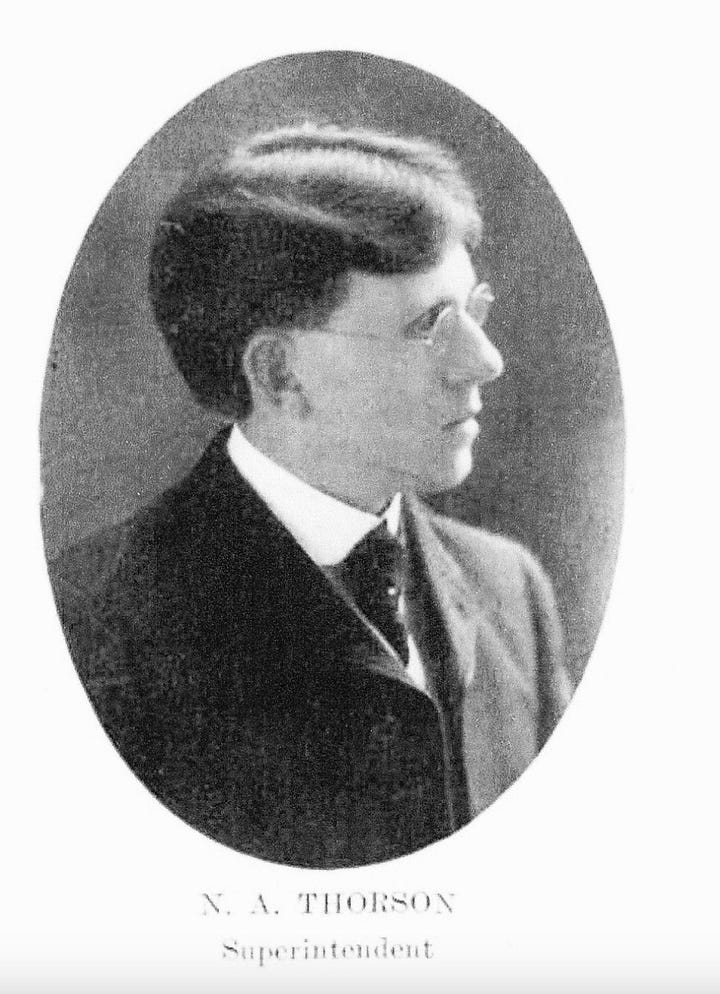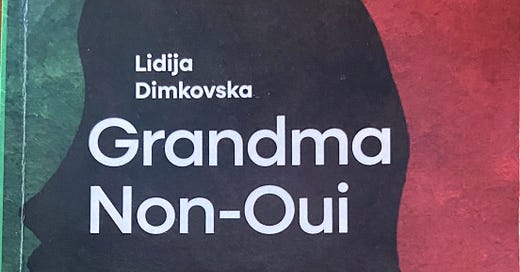“Ever since she died, not a day has gone when I haven’t wanted to speak with her. Her life left more memories than three of my lives ever could…” — From Grandma Non-Oui
Mine left us decades ago, taking whole worlds with them. Reading Grandma Non-Oui, the tender fourth novel by Lidija Dimkovska, got me thinking: if I could have a talk with my late grandparents, if Ouija boards worked, where would I start?
Maybe with Grandpa Fred (Fishel) and the Bukovina in 1909, popping by the lumber mill where his father was the foreman? Or with other details of Jewish life there in Austria-Hungary among the Catholics, both the horas and the horrors? How he got from that hinterland to St. Louis, survived through eighth grade in a new language and then found factory work, socialism, and his bride, Emma? Maybe, if I dared, I’d ask about the belt he used on their kids as he dug ditches and scrounged through the Depression. Dear dead Grandpa Fred, dear dead grandparents all, I know your names and see the frames of your lives, but I want the pictures, the stories.
Emma, what did it mean to be “raised by sisters” after your mother died? Were you fed on rumors of your grandmother’s epic journey: Bavaria to Mobile, and across the Civil War lines, to Illinois? What about that stash of Confederate money, suddenly worthless? What native Zen let Fannie live through all that and still, as she told an interviewer on her 96th birthday, “decide not to worry?” Then how did you bear losing your firstborn, my namesake Jerome, to diphtheria? And why were you so afraid of thunderstorms?
And then there’s Nels Anton Thorson, born in 1881. Grandpa Tony, show me a morning growing up on your father’s Minnesota “poor farm.” What? How did you, a farm sprout, graduate college by 1904 and become superintendent of Polk County schools? What went on day by day at the Ojibway school on the Red Lake Reservation where you were principal? And forgive me, Sarah, Grandma Thorson, I hardly know enough to ask questions. Photos have you touring Europe with your sisters in big hats and going to Oberlin: fancy pants for a young woman from Montevideo. With your sense of manners, how did it all go all those Minnesota towns—Crookston, Detroit Lakes, Paul Bunyan’s Bemidji? I knew you deaf and confused, and I remember the soft rouged mush of a cheek I kissed at your Golden Wedding when I was four. But who were you? Beyond a well-tuned harmony and Haviland china, what did you really want from life? Did you get it?


I was too young to ask you all when I could. So, now I wonder, Google, pore over photos and documents, bother cousins, learn klezmer tunes and a few Norwegian dances, work the jigsaw puzzle of identity. So many missing pieces!
I was led to poke at grandparent memories by the example of Nedjeljka (nicknamed Neda), the 27-year-old narrator of Grandma Non-Oui. She invites us to eavesdrop on imaginary daily conversations with her late grandmother, also named Nedjeljka (she calls her Nonna), recently buried in the family’s backyard in Sicily. And now, English readers can listen in, thanks to Istros Books. This English publisher, with a long list from Central and Southeastern Europe (and aptly named for an ancient name for the Danube), has just put out a beautifully fluent translation by Christina Kramer.
In gentle back-and-forth, the two Nedjeljka’s fill in the picture of a life spanning almost 80 years. It starts in Split on the Dalmatian coast, where World War II brings stories of growing up, survival, and the compromises that tear families apart. Most fatefully, we see Nonna’s post-Armistice encounter with the Italian soldier Carlo Lombardo. It begins with a swoon (his eyes were “the entire Adriatic sea scooped into two vessels” ) and ends with her married and raising a family in Sicily, and staying indoors like the local women to avoid the Mafia.
When the imagined voice of Nonna bears witness to the arrival of war, she speaks in terms trenchant enough to resonate with those children of 1990s Bosnia, Saša and Sara from Where You Come From and Catch the Rabbit:
“It begins with a feeling, a premonition, then unusual signs and signals, then moves on to explosions. You live normally and suddenly the world collapses….Every war closes schools and opens graveyards.”
A Macedonian poet and novelist living in Slovenia, Dimkovska won international recognition for A Spare Life when it was published in English translation in 2016. That novel intimately describes the coming of age and ultimate fates of conjoined twin sisters, in a brilliant allegory for the breakup of Yugoslavia. The same mix of the personal and the historical, the poignancy of individual fates played out in fateful times, also marks Grandma Non-Oui, as the author explains in a 2017 interview in The White Review:
The title of the novel is Non-Oui, or ‘No-Yes’. Or ‘Neda’, short for the name for Nedjeljka, a Croatian woman from Split who moved to Sicily in 1947 after marrying a former Italian soldier, [who] became a partisan in the Yugoslav battalion Garibaldi after the capitulation of Italy. It’s a novel about the Second World War, Croatia and Yugoslavia, and the life of a woman immigrant who lived in Sicily for many years behind closed doors because of a mafia regime. It’s about love, identity, language, about Split and Castellammare del Golfo, about the fascism that is returning to Europe (or never disappeared). It is a human drama of loneliness, of (not) belonging, love, politics, and about how Nedjeljka, suffering from Alzheimer’s disease, forgets the Italian language. Speaking the Croatian language that only her granddaughter can understand, she once again becomes a foreigner. It is a novel about how people become ghosts in their own environments — but who will care for ghosts?
Who will care for ghosts? I try to myself, and here it’s Neda. The searching granddaughter who learns Croatian, who works in a bookstore in Palermo where they sell books by Slavenka Drakulić and Dubravka Ugresić, who visits Split, and who sits graveside day by day, reaching for memories and writing them down, filling in the blanks in Nonna’s story on the way to creating her own.
And prompting the question: if I could, what would I ask the ancestors who are gone? What would you?






Thank you for writing about the book in such an irresistible way, Jerry. I've read "A Spare Life" in English, same translator, and I know what a powerful author Lidija Dimkovska is. I'm tempted to try the Bulgarian translation of "Grandma Non-Oui" now and luckily, the electronic book is available in ozone.bg. Thank you for bringing my attention to it.